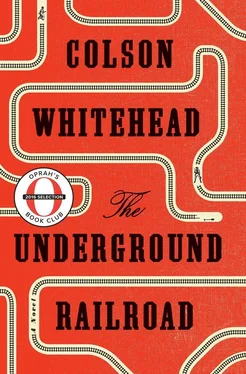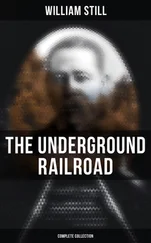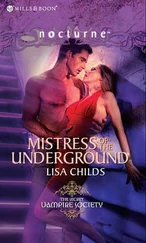“Never been there — the stories are so dismal, I’m liable to lose my temper and make my wife a widow.”
Cora returned his smile. He’d been a presence in the summer months, looking after the Indian corn. The field hands knew indigo, tobacco — cotton, of course — but corn was its own beast. He was pleasant and patient in his instructions. With the changing of the season he was scarce. Feeling poorly, people said. He spent most of his time in the farmhouse, squaring the farm’s accounts.
He wandered to the shelves of maps. Now that they were in the same room, Cora was compelled to rectify her months of silence. She asked after the preparations for the gathering.
“Yes, that,” Valentine said. “Do you think it will happen?”
“It has to,” Cora said.
The meeting had been postponed twice on account of Lander’s speaking engagements. Valentine’s kitchen table started the culture of debate on the farm, when Valentine and his friends — and later, visiting scholars and noted abolitionists — stayed up past midnight arguing over the colored question. The need for trade schools, colored medical schools. For a voice in Congress, if not a representative then a strong alliance with liberal-minded whites. How to undo slavery’s injury to the mental faculties — so many freed men continued to be enslaved by the horrors they’d endured.
The supper conversations became ritual, outgrowing the house and migrating to the meeting house, whereupon Gloria stopped serving food and drink and let them fend for themselves. Those favoring a more gradual view of colored progress traded barbs with those on a more pressing schedule. When Lander arrived — the most dignified and eloquent colored man any of them had seen — the discussions adopted a more local character. The direction of the nation was one matter; the future of the farm, another.
“Mingo promises it will be a memorable occasion,” Valentine said. “A spectacle of rhetoric. These days, I hope they get the spectacle done early so I can retire at a decent hour.” Worn down by Mingo’s lobbying, Valentine had ceded organization of the debate.
Mingo had lived on the farm for a long time, and when it came to addressing Lander’s appeals, it was good to have a native voice. He was not as accomplished a speaker, but as a former slave spoke for a large segment of the farm.
Mingo had taken advantage of the delay to press for improved relations with the white towns. He swayed a few from Lander’s camp — not that it was clear exactly what Lander had in mind. Lander was plainspoken but opaque.
“What if they decide that we should leave?” Cora was surprised at her difficulty in mustering the words.
“They? You’re one of us.” Valentine took the chair that Molly favored on her visits. Up close, it was plain the burden of so many souls had exacted its toll. The man was weariness itself. “It may be out of our hands,” he said. “What we built here…there are too many white people who don’t want us to have it. Even if they didn’t suspect our alliance with the railroad. Look around. If they kill a slave for learning his letters, how do you think they feel about a library? We’re in a room brimming with ideas. Too many ideas for a colored man. Or woman.”
Cora had come to cherish the impossible treasures of the Valentine farm so completely that she’d forgotten how impossible they were. The farm and the adjacent ones operated by colored interests were too big, too prosperous. A pocket of blackness in the young state. Valentine’s negro heritage became known years before. Some felt tricked that they’d treated a nigger as an equal — and then to have that uppity nigger shame them with his success.
She told Valentine of an incident the previous week, when she’d been walking up the road and was almost trampled by a wagon. The driver yelled disgusting epithets as he passed. Cora was not the only victim of abuse. The new arrivals to the nearby towns, the rowdies and low whites, started fights when residents came for supplies. Harassed the young women. Last week a feed store hung a shingle saying WHITES ONLY — a nightmare reaching up from the south to claim them.
Valentine said, “We have a legal right as American citizens to be here.” But the Fugitive Slave Law was a legal fact as well. Their collaborations with the underground railroad complicated things. Slave catchers didn’t show their faces often, but it wasn’t unheard of. Last spring, two catchers appeared with a warrant to search every house on the farm. Their quarry was long gone, but the reminder of the slave patrols exposed the precarious nature of the residents’ lives. One of the cooks urinated in their canteens as they ransacked the cabins.
“Indiana was a slave state,” Valentine continued. “That evil soaks into the soil. Some say it steeps and gets stronger. Maybe this isn’t the place. Maybe Gloria and I should have kept going after Virginia.”
“I feel it when I go to town now,” Cora said. “See that look in their eyes I know.” It wasn’t just Terrance and Connelly and Ridgeway she recognized, the savage ones. She’d watched the faces in the park in North Carolina during the daytime, and at night when they gathered for atrocities. Round white faces like an endless field of cotton bolls, all the same material.
Taking in Cora’s downcast expression, Valentine told her, “I’m proud of what we’ve built here, but we started over once. We can do it again. I have two strong sons to help now, and we’ll get a nice sum for the land. Gloria has always wanted to see Oklahoma, although for the life of me I don’t know why. I try to make her happy.”
“If we stay,” Cora said, “Mingo wouldn’t allow people like me. The runaways. Those with nowhere to go.”
“Talk is good,” Valentine said. “Talk clears the air and makes it so you can see what’s what. We’ll see what the mood of the farm is. It’s mine, but it’s everybody’s, too. Yours. I’ll abide by the decision of the people.”
Cora saw the discussion had depleted him. “Why do all this,” she asked. “For all of us?”
“I thought you were one of the smart ones,” Valentine said. “Don’t you know? White man ain’t going to do it. We have to do it ourselves.”
If the farmer had come in for a specific book, he left empty-handed. The wind whistled through the open door and Cora pulled her shawl tight. If she kept reading, she might start another book by suppertime.

The final gathering on Valentine farm took place on a brisk December night. In the years to come, the survivors shared their versions of what happened that evening, and why. Until the day she died, Sybil insisted Mingo was the informer. She was an old lady then, living on a Michigan lake with a gang of grandchildren who had to listen to her familiar stories. According to Sybil, Mingo told the constables that the farm harbored fugitives and provided the particulars for a successful ambush. A dramatic raid would put an end to relations with the railroad, the endless stream of needy negroes, and ensure the longevity of the farm. When asked if he anticipated the violence, she pressed her lips into a line and said no more.
Another survivor — Tom the blacksmith — observed that the law had hunted Lander for months. He was the intended target. Lander’s rhetoric inflamed passions; he fomented rebellion; he was too uppity to allow to run free. Tom never learned to read but liked to show off his volume of Lander’s Appeal , which the great orator had signed to him.
Joan Watson was born on the farm. She was six years old that night. In the aftermath of the attack she wandered the forest for three days, chewing acorns, until a wagon train discovered her. When she got older, she described herself as a student of American history, attuned to the inevitable. She said that white towns had simply banded together to rid themselves of the black stronghold in their midst. That is how the European tribes operate, she said. If they can’t control it, they destroy it.
Читать дальше













